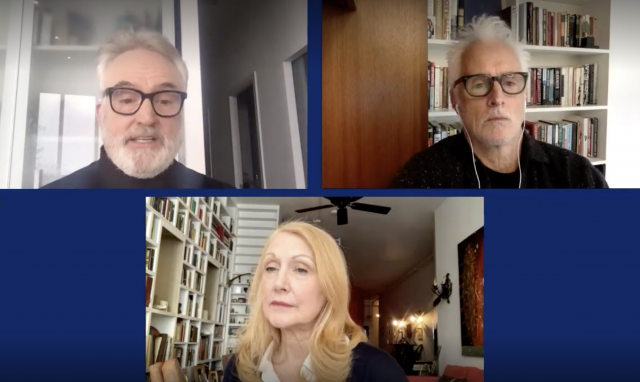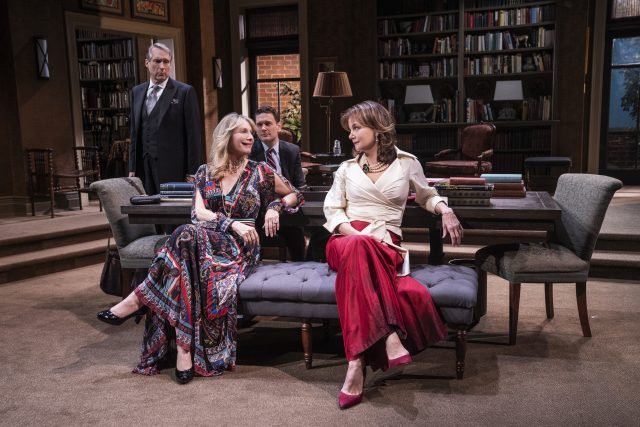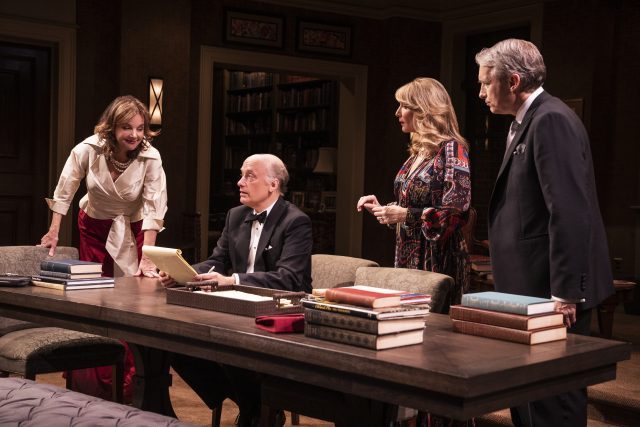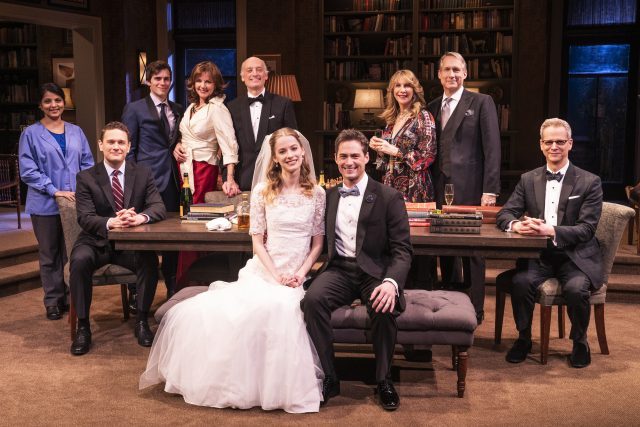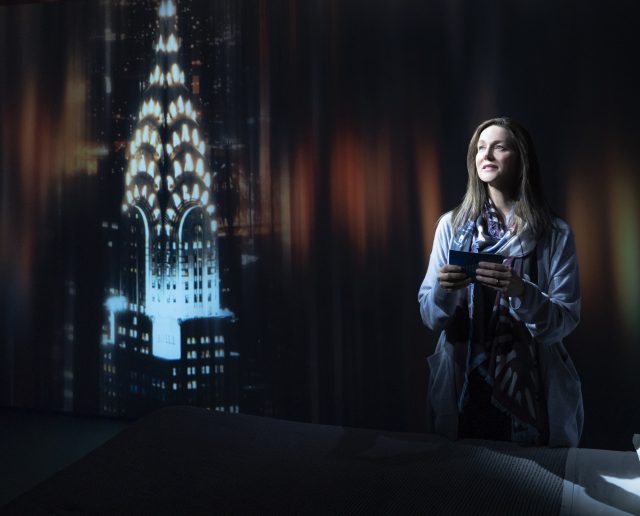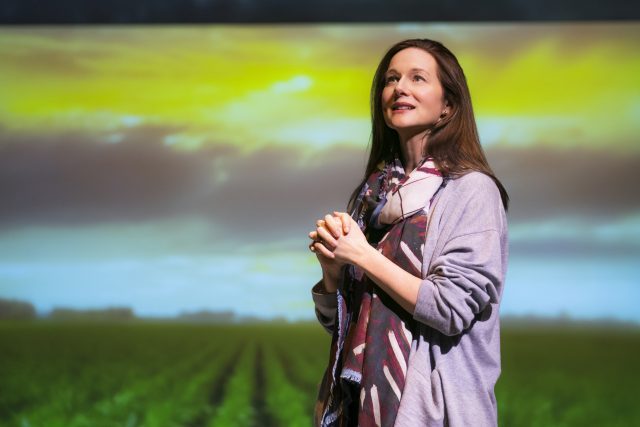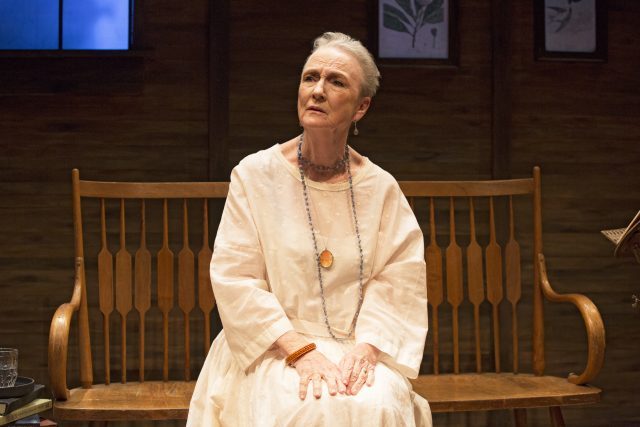
Kathleen Chalfant is radiant as Mabel Loomis Todd in A Woman of the World (photo by Carol Rosegg)
A WOMAN OF THE WORLD
59E59 Theaters
59 East 59th St. between Park & Madison Aves.
Tuesday – Sunday through November 17, $25-$35
212-279-4200
www.59e59.org
Currently two one-person shows about real women are running off Broadway, both with a feminist bent, both starring New York theater legends. Yet they could not be more different, one far superior to the other. At 59E59, five-time Obie winner Kathleen Chalfant is beautifully portraying Mabel Loomis Todd (1856–1932) in the Acting Company’s world premiere of Pulitzer Prize finalist Rebecca Gilman’s utterly delightful A Woman of the World. It’s 1931, and Todd is giving a lecture, “The Real Emily Dickinson,” at the Point Breeze Inn on Maine’s Hog Island. In the 1890s, Todd edited several collections of Dickinson’s poetry, published after the reclusive New England poet’s death in 1886 at the age of fifty-five, and Todd built a lucrative and unusual career around her association with Dickinson. Todd’s talk is supposed to be about Dickinson, but it ends up instead delving into Todd herself as she shares intimate stories about her own life, including her relationship with her husband, astronomer David Todd; her close friendship with Emily and her brother Austin; and her affection for Hog Island, much of which she owns.
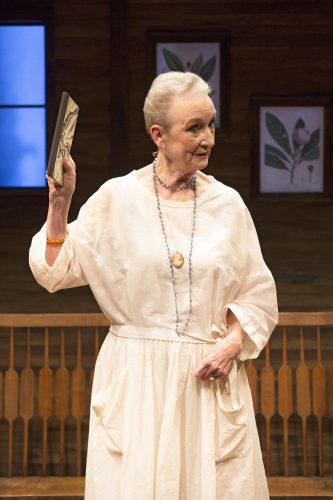
Mabel Loomis Todd (Kathleen Chalfant) details her relationship with Emily Dickinson and her family in A Woman of the World (photo by Carol Rosegg)
“If you haven’t already, do step outside tonight and look at the sky. It’s one of those clear nights on Hog Island when the stars are so close you feel like you could reach out and touch Polaris,” she says wistfully. “And while you’re out there, listen closely and you’ll hear — well, besides the wind in the trees — and the waves on the rocks — which together comprise the most peaceful sound I know. . .” Margaret Montagna’s sound design includes chirping birds that add to the allure. Todd continually turns to her unseen daughter, Mrs. Millicent Bingham, who is signaling her from the back, particularly as her mother gets distracted and goes off topic, letting her personal biases and vengeful character show through, as well as her extreme self-aggrandizement. “I confess to you, it’s been something of a burden to me over the years that men have always found me impossible to resist. And it’s not because of anything I actively do to attract them,” she boasts. “It’s because the average man is rarely exposed to someone of my natural talents, and singular charm. When I was young, I was renowned for my beauty. But more than that, I was an accomplished artist.” There’s seemingly nothing Todd couldn’t do, and she wants the audience to know about it all.
But soon after she notes that “like all families, the Dickinsons had their secrets,” it’s the Todd family secrets that come pouring out, one after another, offering myriad surprises and more than a few shocks. Chalfant (Wit, Talking Heads) fully embodies the elegant and graceful Todd, wearing an ankle-length off-white dress with a long necklace and short hair like a second skin. (The costume is by Candice Donnelly.) She is captivating and beguiling as she slowly glides around Cate McCrea’s tiny yet cozy set, featuring a wooden bench, a pair of carpets, and two stacks of books on the floor, with framed pictures of plants on the wall and a window revealing clouds and sky. Gilman (Soups, Stews, and Casseroles: 1976; The Glory of Living) and director Valentina Fratti (Williston, R.U.R.) turn the 2019 audience at 59E59 into the 1931 crowd in the parlor at the Point Breeze Inn as we hang on Todd’s every word and movement, enraptured by the house of cards she has so carefully constructed. Todd was clearly ahead of her time, in more ways than one.
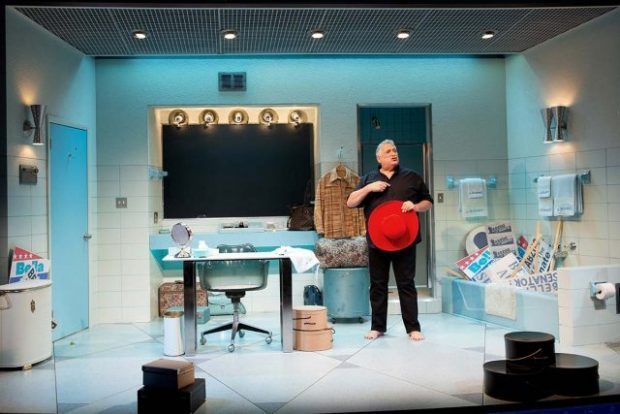
Harvey Fierstein plays firebrand Bella Abzug in Bella Bella (photo by Jeremy Daniel)
BELLA BELLA
Manhattan Theatre Club
MTC at New York City Center
130 West 56th St. between Sixth & Seventh Aves.
Tuesday – Sunday through December 1, $99-$139
212-581-1212
www.manhattantheatreclub.com
bellabellaplay.com
Four-time Tony winner Harvey Fierstein pays tribute to another woman ahead of her time, Bella Savitsky Abzug (1920-98), in Bella Bella, an MTC production making its world premiere at New York City Center. Fierstein wrote the play, based on Battling Bella’s own words, and stars as the Bronx-born firebrand, an antiwar social activist, feminist, and lawyer who spent three terms as a US Congresswoman. It’s September 15, 1976, and Abzug is cooped up in the cluttered bathroom of a room at the Summit Hotel on West Fifty-Seventh St. while awaiting the returns in her Senate primary race against Daniel Patrick Moynihan. Her husband, Martin; daughters, Eve and Liz; sister, Helene; press secretary, Harry Holzer; and famous friends Shirley, Lily, and Gloria are all gathered outside the bathroom, cheering on the outspoken Abzug, who spends the time regaling the audience with anecdotes from her personal and professional life, focusing on how she has never backed away from a challenge.
“When I started this whole senatorial campaign,” she explains, “a pollster handed me a survey and was surprised when I threw it back in his face. ‘Would you vote for a woman if she was qualified?’ Now why the hell does a woman have to be qualified when a man only has to be a man?” Further regarding woman politicians, she declares, “We are not all good any more than all men are bad. But to my grave I will defend the right of a woman to be an unqualified asshole and still become president just like a man.”

Harvey Fierstein wrote and stars in Bella Bella (photo by Jeremy Daniel)
The play is stuffed with such quotes, in addition to Yiddish phrases, and Fierstein (Torch Song Trilogy, Casa Valentina often mugs to the audience for extra laughs. It’s more like a series of gags than a compelling narrative. Fierstein first appears onstage silhouetted in the shower entrance, holding one of Abzug’s trademark large hats. The hat “kinda became my thing,” she later notes. “And the press, the only thing they wrote about was, ‘The hat. The hat. The hat.’ I finally said, ‘Anyone want to know what’s under the hat?’” But Fierstein puts away the hat after the beginning and chooses not to impersonate Abzug or her style; instead, he speaks like himself, and he wears a black shirt and pants, standing barefoot on the stage. (The costume is by Rita Ryack.) Thus, we’re all too well aware that we are watching Harvey Fierstein as Bella Abzug, a stark contrast to Kathleen Chalfant’s expert personification of Mabel Loomis Todd. Director Kimberly Senior (Disgraced, The Niceties) seems limited by John Lee Beatty’s busy set, which includes a stellar rendering of the facade of the Summit Hotel but nothing is done with it aside from a very brief, very tiny shadow of a person walking down the hall. Abzug was a central figure of life in New York City in the 1970s, a passionate leader and fighter, but Fierstein never grabs hold of the era or the woman, and neither do Caite Hevener’s period projections. We never get to know any more about what’s under the hat than we did when we came in, which is a shame, because there was no one else quite like Bella.

